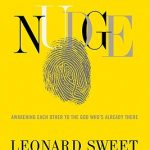Sweet, Leonard. Nudge: Awakening Each Other to the God Who’s Already There. David C. Cook, 2010. ISBN: 9781434764744.
Leonard Sweet is the E. Stanley Jones professor of evangelism at Drew University and visiting distinguished professor of Evangelism at George Fox University, was voted one of the 50 Most Influential Christians in America, and continues to write and speak prophetically about the church. An ordained United Methodist pastor, Sweet has authored over 20 books and 600 articles, and is perhaps best known for his forward thinking ideas about the church. For more information, friend him on facebook, follow him on twitter, or visit his website.
Book Basics
Nudge moves away modernist evangelistic methods that Sweet labels unilateral by constructing a fully postmodern concept evangelism based on mutuality and shared interaction in which all participants are changed by increased awareness of a God who is already present. The book is divided into two parts. Part one focuses on constructing what nudge is all about. Nudge evangelism begins with three basic assumptions: (1) Jesus is alive and active in our world, (2) Followers of Jesus “know” Jesus well enough to recognize where he is alive and moving our day, and (3 )Evangelists nudge the world to wake up to the alive and acting Jesus and nudge others in the ways God is active and moving (p.34). Part two explains how nudge works through the senses. In this section, Sweet devotes a chapter each to five ways of sensing Jesus: hearing, tasting, seeing, touching and breathing.
evangelism based on mutuality and shared interaction in which all participants are changed by increased awareness of a God who is already present. The book is divided into two parts. Part one focuses on constructing what nudge is all about. Nudge evangelism begins with three basic assumptions: (1) Jesus is alive and active in our world, (2) Followers of Jesus “know” Jesus well enough to recognize where he is alive and moving our day, and (3 )Evangelists nudge the world to wake up to the alive and acting Jesus and nudge others in the ways God is active and moving (p.34). Part two explains how nudge works through the senses. In this section, Sweet devotes a chapter each to five ways of sensing Jesus: hearing, tasting, seeing, touching and breathing.
So What?
There are hundreds of books available for those who want to understand evangelism from the perspective of a modern worldview. Most of the well known books offer a system by which the evangelist does something to or evangelizes the other. By postmodern standards these methods are paternalistic, condescending, and ineffective. Whether or not one agrees with Sweet, his work is worth reading as it moves the conversation about evangelism forward into genuine relational engagement wherein both parties grow and are changed by the encounter, which is a much better fit in postmodernity.
- What is your definition of evangelism?
- What methodology are you most comfortable with? Why? Do you find most effective? Do you find best suited for postmodernity?
- Does your congregation have an evangelism team/committee? If so, what does this group do? Are others in the congregation relieved of the duty of evangelism by their absence on this team? If not, what is done to equip them for that ministry?
- What is your initial response to the idea that evangelism is nudging (the other and the self) toward an awareness of the God who is already there?
To assist those who would like to use this book for a group study, a pdf file with discussion question is available on the book’s interactive website.
Note: Click here to read my review of Leonard Sweet’s So Beautiful: Divine Design for Life and the Church (2009).
